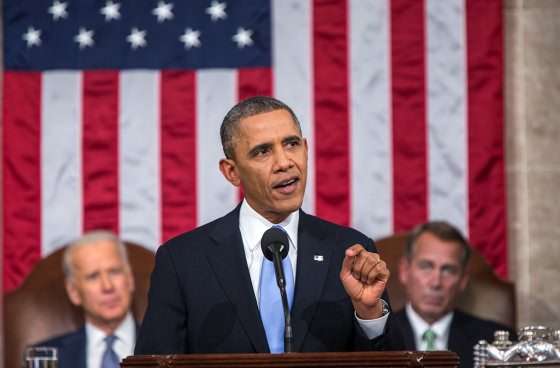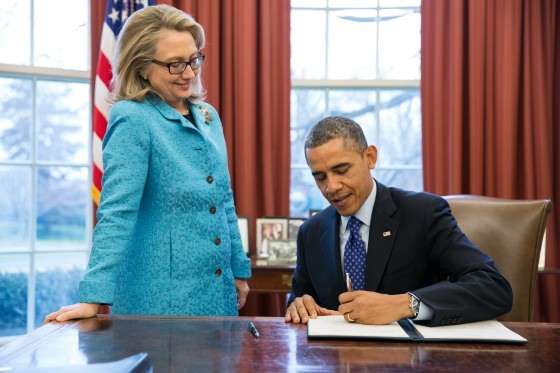Obama's State of the Union Address Was a Bid to Influence the Next Democratic Campaign
Obama, bored with Congress, stages a kickoff event for an imaginary third term.

Since 2008, President Barack Obama has been the most important man in politics. He was the protagonist of the meta-story that is American government, the central figure in the political theater of Washington, D.C.
The narrative of government was his narrative, one that he could shape and influence, if not quite fully control.
But as Obama enters the final two years as president, his grip on that story is slipping. Yes, he's still the most prominent elected official in the nation, a powerful executive who controls the bully pulpit. But as Republicans have overtaken Congress, the narrative has shifted and scattered, and as the 2016 campaign grows louder it will scatter even further. Obama is on the way to losing his relevance.
Last night's State of the Union address was a bid to maintain that relevance through 2016 and in the years beyond. Mostly beyond. As an Associated Press report suggested in a preview yesterday, key proposals from the speech appeared "to be aimed at driving the debate in the 2016 election on income inequality and middle-class economic issues, rather than setting a realistic agenda for Congress."
In theory, the State of the Union is a report submitted to Congress for their benefit. In practice, Congress was barely necessary. At this point, the Obama White House is only interested in Congress to the extent that it is willing to rubber stamp the president's agenda. And the agenda presented last night was one that Republicans in Congress were certain to dismiss: tax hikes and an expensive free college program, free childcare and mandatory paid sick leave.
No, this was not an agenda for Congress. It was an agenda for a Democratic presidential campaign, or perhaps an administration. It was a marker, designed to shape future Democratic candidates, and, as David Frum suggests, Hillary Clinton most of all. The various proposals Obama offered were not designed to pass or serve as the starting point for compromise measures that could pass, but to generate responses from Clinton and other possible contenders, narrowing their options and, in the process, making them more Obama-like. Obama used the State of the Union to ensure that her campaign does not veer too far from the one he would like to see.

Indeed, Obama seemed almost wistful last night when he noted that he had run his last campaign—and then responded to Republican cheers with an ad-libbed retort: "I won them both." Obama has always preferred campaigning to governing, and last night's speech was a kind of imaginary campaign speech, a kickoff event for the campaign he would have run.
Perhaps the most telling quote about the speech was the one White House adviser Dan Pfeiffer gave to The Washington Post shortly before the speech: "We will not be limited by what will pass this Congress, because that would be a very boring two years." Obama is bored with Congress, and he barely bothers to hide it.
The legislators who came and watched and cheered last night were, for the most part, just props in Obama's stage play. Last night's address was delivered to Congress, but it was not really to Congress, or about them. There was essentially no recognition of the defeat Obama's party suffered at the polls last November, a defeat driven by widely shared frustration with the president, no sense that the president plans to compromise his ambitions as a result. Obama, the candidate of change, declined to change.
Instead, he closed with an extended reminder that he remains the same person he was during his 2008 campaign, with the same beliefs and values and sensibilities. He still believes in his own story, and his speech was a call for others to continue that story even after he has left the central role.


Show Comments (98)